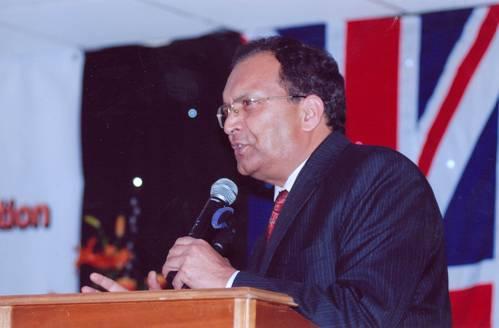
Khin Maung Win/Associated Press
Obama’s historic trip to Myanmar today – the first by a sitting US president – is the result of a widespread myth about the reform process in that country. Many campaigners have criticised him for rewarding President Thein Sein’s government too soon for its minor set of reforms over the past two years. But the US administration justifies the trip on the grounds of a story we are repeatedly told about what is happening in Myanmar at the moment – that a struggle is taking place with the government between reformists, represented by President Sein, and a shadowy group of conservative hardliners. The story goes that the reform process is on a knife edge and could be reversed at any time.
But what proof do we have of this division within the government? What if that is just a story designed to encourage Western governments to engage quickly, lest the evil conservatives overpower the trusty reformers and send the country back to the days of totalitarian dictatorship? The whole thing is cast in simplistic tones of good and evil, and offers Western governments a chance to play their favourite role – as the saviours of Democracy and Justice, riding in to provide crucial support to the good guys in their time of need. That this also opens the doors for Western businesses to feast on a virginal marketplace is a handy bonus.
Many observers are highly sceptical about this story of hardliners vs reformists. Jan Zalewski, a Burmese-speaking analyst for IHS Global Insight, argues that the entire reform process is a carefully stage-managed production that has been on the drawing board for the past 20 years.
“The reform process has been initiated by the military itself and is very controlled by them,” he told me in an interview for a piece I wrote for today’s The National. “There is a lot of cohesion within government about where it’s moving. There is only disagreement about more nuanced details – how far democratic reforms should go and how quickly. Thein Sein actually represents a kind of status quo. What’s coming out of the government would not be happening if [the military] didn’t want it.”
The military recognised years ago that the economy desperately needed foreign investment and that this required some level of international acceptance for the regime. Paranoid delusions that a Western country might invade at any moment also acted as push towards reconciliation with the world (it’s what led them to build their ridiculous new capital inland at Naypyidaw – see my article on the world’s emptiest capital here).
The military have done the bare minimum to gain that international acceptance. They released the most important figurehead of reform – Aung San Suu Kyi – along with some other political prisoners, while leaving many more behind bars. They relaxed censorship laws a little, legalised trade unions and allowed Ms Suu Kyi’s party, the National League for Democracy (NLD) to stand for a few seats in parliament in April’s by-elections.
But all this came after the military’s grip on political power had been firmly established in a new constitution (passed through an outrageously flawed referendum in 2008), followed by massively rigged elections in 2010 in which members of the military junta simply traded in their uniforms for suits in order to claim they were suddenly a civilian government. Only then did the supposedly reformist figure of Thein Sein arrive to tell the world that Myanmar had changed and everything was now lovely, and yes please, we will take that money now. The world happily glossed over the fact that he was a former lieutenant general, henchman to dictator Than Shwe and had cultivated dubious links to drug lords in Wa state during his time overseeing the brutal counter-insurgency in that region. He was considered a front-runner for this year’s Nobel peace prize.
The government’s much-lauded ceasefires with ethnic rebel groups have done nothing to resolve the fundamental tensions between the Burmese centre and the ethnic provinces, and the government actually restarted the war in the northern Kachin state AFTER the reform process began. The total failure of the authorities to address the brutal persecution of Rohingya Muslims in the western Rakhine state in recent months is further proof of how attitudes to minorities remain unchanged.
True, now that it’s begun, there is a chance that the reform process will build its own momentum and go beyond what the military rulers want. What happens at the next general election in 2015 will be very interesting. With enough support, it is likely that the NLD will press for changes in the constitution to reduce the military’s power. That will be the real testing point.
But Ms Suu Kyi and the NLD are politicians – not revolutionaries. They also lack political experience. Already, serious divisions have appeared in the party over how it is run, and the compromises being made by its leaders in order to secure their place in the system. More than 130 members resigned last month in one Irrawaddy region over alleged ‘cronyism’ in the party’s decision-making process.
For now, the reform process has been extremely well managed by President Sein and the military regime that stands behind him. They may well be able to outmaneuver their more democratic opponents and retain the military’s powerful position for many years to come, while also benefiting from improved economic and diplomatic relations with the world. Mr Obama’s visit is a major step towards that goal.





